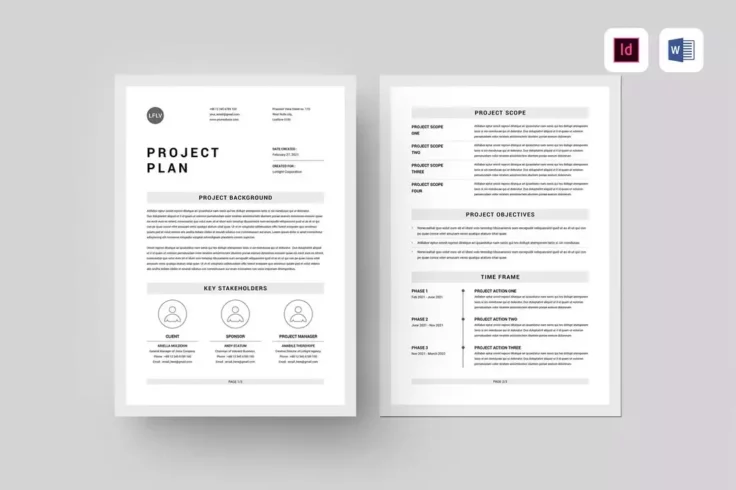20+ Best Business Plan Templates
Organize your year beautifully with our calendar templates. These tools provide a range of designs that can help you create unique, visually engaging calendars.

Simple Word Business Plan Template
This business plan template also features a simple design. It’s ideal for startups, agencies, and even small businesses for making a business pl...

Modern Business Plan Template for Word
A business plan document is about presenting your goals, missions, and vision for the company in an appealing way. Having a great-looking design is a ...

One Page Business Plan Template for Word
Sometimes a simple one-page document is more than enough to highlight the key points of a business plan. This template is ideal for making such brochu...

One Page Simple Business Plan Word Template
This simple and minimal business plan template is perfect for making a one-page brochure or even a two-page document. The template comes with 2 page l...

Business Project Plan Template for Word
A simple business plan template for small brands. This template includes 3 unique page layouts for crafting a basic business plan. It’s ideal ev...

Business Plan Brochure Template for Word
If you want to make an impressive and attractive business plan brochure for a big company or a corporate brand, this Word template will come in handy....

Clean Business Plan Microsoft Word Template
If you want to make sure your business plan looks more professional, a clean and minimal design is the best choice for your brochure. With this templa...

Minimal Business Plan Word Template
Looking for a clean, simple, and minimalist business plan template? Then this Word template is made just for you. It has a very light and simple layou...

Creative Business Plan Template for Word
This is a massive business plan template that comes with more than 60 different page layouts to choose from. It’s especially suitable for agenci...

Marketing & Sales Plan Word Template
Marketing and sales plans are also part of a business plan, especially for marketing agencies. With this Word template, you can design an effective sa...

Simple Business Plan Template for Word
This Word business plan template uses a very simple design. It doesn’t have too many design elements, images, or lots of colors. Instead, the de...

Big Business Plan Brochure Template for Word
Get started with this Word template to make business plan documents with clean and minimal design. It includes 28 unique pages with easily editable la...

Startup Business Plan Word Template
This Word business plan template is designed specifically for startups and agencies. It features a set of modern page layouts, 20 custom page designs ...

Bold Business Plan Word Template
If you want to make a bold business plan with a high-end luxury feel, this Word template will come in handy. It features a dark color theme that will ...

Multipurpose Business Brochure Word Template
This brochure template features multipurpose page layouts. This means you can edit and customize each page to make many different types of documents, ...

Real Estate Business Plan Template for Word
This Word template features a very clean and visual-centric design that’s ideal for making business plans for real estate and rental property bu...

Creative Business Plan Template for Word
A creative business plan Word template that comes with more than 50 different page designs. With this template, you can make all kinds of business pla...

Education School Plan Template for Word
You can use this Word template to make a stylish business plan or educational plan for a school. The template has fully customizable paragraph styles,...

Editable Business Plan Template for Word
Every Word template should give you the freedom to edit, customize, and do anything you want with the design. This template lets you do all that and m...

Basic Microsoft Word Business Plan Template
If you want to make a simple and basic business plan for a small company, this Word template is for you. It features a minimal layout with a basic des...

Education Business Plan Word Template
This Word template is designed for making business plan documents related to educational brands and businesses. However, you can easily customize the ...

Company Proposal & Business Plan Word Template
Whether you want to make a business plan or a proposal document, this Word template can handle both. It features a modern and professional layout for ...

Modern Proposal Brochure Template
This brochure template is perfect for putting together a business proposal for a corporate brand or agency. The template includes 20 unique page layou...
FAQs About Business Plan Templates
What Are Business Plan Templates?
A business plan template is a detailed document that serves as a roadmap for your business. It outlines your business goals, the strategies you plan to use to attain these goals, the market you want to target, any potential obstacles your business might encounter, and how you plan to handle these challenges.
Business plan templates are essential in helping you articulate your vision, mission, and market analysis succinctly. By using a template, you can maintain a professional tone and ensure all essential bases are covered while crafting your business strategy.
How Do I Use a Business Plan Template?
Using a business plan template involves filling in specific details about your business into given sections. It starts with an executive summary, following which you'll add information about your company, the products or services you offer, your marketing and sales strategy, and financial projections.
While the template provides a standard structure, it's crucial to personalize it to suit your unique business needs. You may need to add, remove, or adapt some sections depending on your business type or the investor/bank's specific requirements.
Why Should I Use a Business Plan Template?
Creating a business plan from scratch can be overwhelming, especially if you're not familiar with the standard format or what to include. A business plan template simplifies the process, provides guidance, and ensures you don't miss any critical pieces of information.
Templates also save time and ensure consistency, which is highly valued by investors, lenders, and any other stakeholders who may review your plan. Having a well-prepared template also helps you think through every aspect of your business, strengthening your approach towards achieving your business goals.
Are Business Plan Templates Suitable For All Types of Businesses?
Most standard business plan templates remain versatile and flexible to cater to various business needs. Regardless of whether you're running a startup, a small business, an ecommerce store, or a huge corporation, you'll find business plan templates useful for charting your strategic course.
However, while some sections may be ubiquitous, you might need to tweak or add others depending on your industry or unique business characteristics. For example, a SaaS (software as a service) company's business plan might focus more on technology development and intellectual property, while a retail store may emphasize location and market demographics.
Where Can I Find a Business Plan Template?
You'll find a variety of resources offering business plan templates online. Some are free, while others require purchase or a subscription. Websites like SCORE, a nonprofit association dedicated to helping businesses get off the ground, offers free business plan templates.
Other sources include business software providers, business advisory services, and online template stores. Before choosing a template, understand what your business needs and ensure the template you choose meets those requirements.